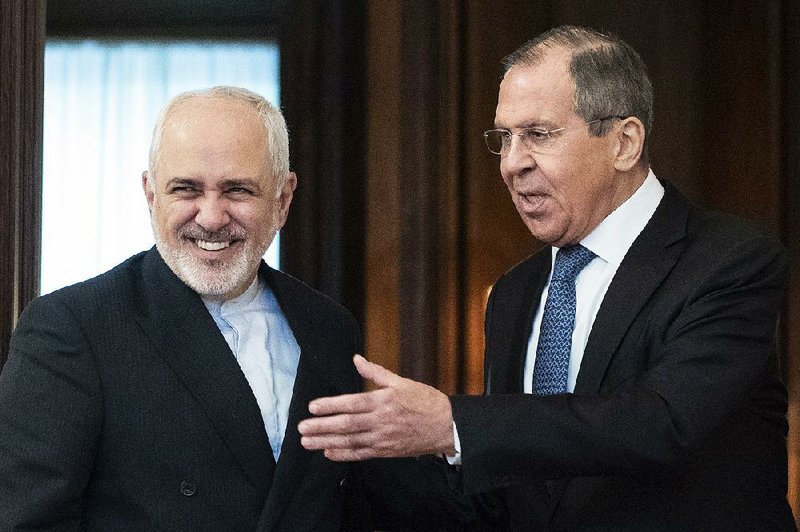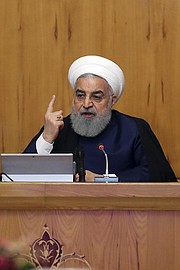TEHRAN, Iran -- Iranian President Hassan Rouhani announced Wednesday that his country was taking steps to end its compliance with elements of the 2015 nuclear accord.
In a televised speech, Rouhani said Iran would hold on to stockpiles of excess uranium and heavy water used in its nuclear reactors. He set a 60-day deadline for agreeing to new terms in the nuclear accord, after which Tehran will resume higher uranium enrichment if no deal is reached.
"We are ready to negotiate within the boundaries of JCPOA," he said, referring to the Joint Comprehensive Plan of Action nuclear deal. "It is not us who has left the negotiation table."
In November, the United States reimposed sanctions that have strangled Iran's oil and banking sectors as well as its foreign trade. The sanctions came months after President Donald Trump's administration decided to withdraw from the pact that Iran negotiated with world powers in 2015. The deal curbed Iran's nuclear program in exchange for widespread sanctions relief.
Rouhani's speech coincided with the first anniversary of the U.S. withdrawal and came at a time of heightened American economic and military pressure on Iran.
Later Wednesday, Trump issued an executive order announcing new sanctions targeting Iran's steel, aluminum, copper and iron sectors, which provide foreign currency earnings for Tehran.
Rouhani earlier compared the situation to a medical emergency for the Islamic Republic.
"We felt that the nuclear deal needs a surgery, and the painkiller pills of the last year have been ineffective," Rouhani said. "This surgery is for saving the deal, not destroying it."
Iran on Wednesday stopped its sale of excess uranium and heavy water as a first step, Rouhani said. Such sales are required under the deal. The U.S. last week ended deals allowing Iran to exchange its enriched uranium for unrefined yellowcake uranium from Russia, and to sell its heavy water, which is used as a coolant in nuclear reactors, to Oman.
In 60 days, if no new deal is in place, Iran will increase its enrichment of uranium beyond the accord-permitted 3.67%, which can fuel a commercial nuclear power plant. Rouhani did not say how far Iran would be willing to enrich its uranium, although the head of its nuclear program reiterated that Iran could reach 20% enrichment within four days.
Once a country enriches uranium to about 20%, scientists say, the time needed to reach the 90% threshold for weapons-grade uranium is halved. Iran long has maintained that its nuclear program is for peaceful purposes. However, Iranian state television's English-language service Press TV, citing sources close to the presidency, said the country would withdraw from the Nuclear Nonproliferation Treaty if Europeans sought to sanction Iran at the U.N. Security Council.
Rouhani also said that if the 60 days pass without action, then the country will halt a Chinese-led effort to redesign Iran's Arak heavy water nuclear reactor. Such reactors produce plutonium that can be used in nuclear weapons.
Iran earlier in the day delivered letters to Britain, Russia, China, the European Union, France and Germany to notify them of the decision. All were signatories to the nuclear deal and continue to support it.
"If the five countries join negotiations and help Iran to reach its benefits in the field of oil and banking, Iran will return to its commitments according to the nuclear deal," Rouhani said.
Iranian Foreign Minister Mohammad Javad Zarif met Wednesday in Moscow with Russian counterpart Sergey Lavrov to personally deliver the letter.
"You know, we've been patient for a year," Zarif told Lavrov, according to a Russian translation of Zarif's remarks.
Kremlin spokesman Dmitry Peskov said Wednesday that Putin saw "no alternative" to the Iran nuclear deal, Russian news agencies reported. Peskov said the Trump administration's "poorly conceived, reckless decisions" have led Iran to curtail its commitments.
"Russian diplomats will certainly continue to discuss this issue, including with European partners, in order to achieve the long-term sustainability" of the Iran deal, Peskov said.
Zarif separately issued his own warning from Moscow.
"After a year of patience, Iran stops measures that [the] US has made impossible to continue," he tweeted. World powers have "a narrowing window to reverse this."
NATIONS REACT
Reaction came swiftly from Israeli Prime Minister Benjamin Netanyahu, a staunch critic of Iran and the nuclear deal.
"I heard that Iran intends to continue its nuclear program. We will not allow Iran to obtain nuclear weapons," Netanyahu said. "We will continue to fight those who seek to take our lives, and we will thrust our roots even deeper into the soil of our homeland."
U.S. Secretary of State Mike Pompeo, speaking in London, said America "will wait and observe" what Iran does next.
"They have made a number of statements about actions they have threatened to do in order to get the world to jump," Pompeo said.
Rouhani also made an implicit threat to Europe, saying Iran now cooperates on issues such as targeting Afghan opium and hashish traffickers and controlling immigration.
"You are obliged ... for your own security, for protecting your youths against drugs as well as controlling [the] influx of immigrants," the president said.
British Foreign Secretary Jeremy Hunt called Iran's threat to resume higher enrichment of uranium an "unwelcome step."
French Defense Minister Florence Parly was much more dire. "Nothing would be worse than Iran leaving this deal," she told BMFTV.
But she said Europe remains committed to supporting the agreement. Europe "wants to be able to continue to keep this agreement alive," she said.
China's Foreign Ministry said the U.S. has "further aggravated" tensions over the Iran nuclear issue.
Foreign Ministry spokesman Geng Shuang said China appreciated Iran's "strict implementation" of the 2015 nuclear deal.
"We call on all parties concerned to exercise restraint, strengthen dialogue and avoid escalating tensions," he said.
Iran's move comes days after the White House said it dispatched the aircraft carrier USS Abraham Lincoln and B-52 bombers to the Persian Gulf over what it described as a new threat from Iran. Israel, which has conducted pre-emptive bombings of nuclear facilities in Iraq and Syria, has vowed to never allow Iran to obtain an atomic weapon.
The general staff of Iran's armed forces issued a statement applauding Rouhani's decision and warning its enemies.
"Any possible movement by them will face a regrettable response by Iranian nation and its armed forces," the statement said, according to the semiofficial Fars news agency.
The U.S. withdrew from the deal after the Trump administration contended the accord should have limited Iran's ballistic missile program and what it describes as Tehran's malign regional influence.
However, the U.N.'s atomic watchdog, the International Atomic Energy Agency, repeatedly has verified that Iran stuck to the terms of the deal. The agency did not respond to a request for comment Wednesday.
After the U.S. withdrew from the accord, it restored the sanctions, exacerbating a severe economic crisis. The Iranian rial, which traded at 32,000 to $1 at the time of the accord, traded Wednesday at 153,500 to $1.
On the streets of Tehran, the mood was mixed as people are struggling to make ends meet while the Iranian currency collapses.
"It was a good but late decision by Iran," said Soroush Kamali, a 21-year-old geography student. "The West should learn that they cannot remain idle while Iranian people are suffering from sanctions."
Zahra Ahari, a 43-year-old homemaker, simply wished for things to get better.
"I do not understand the terms and words of officials. They should do something to make our life easier," Ahari said. "I hope the new decision will have such an impact."
Information for this article was contributed by Amir Vahdat, Jon Gambrell, Ilan Ben Zion, Matthew Lee and staff members of The Associated Press; and by Tamer El-Ghobashy, Kareem Fahim, Michael Birnbaum, Anton Troianovski, Ruth Eglash and Loveday Morris of The Washington Post.
A Section on 05/09/2019

